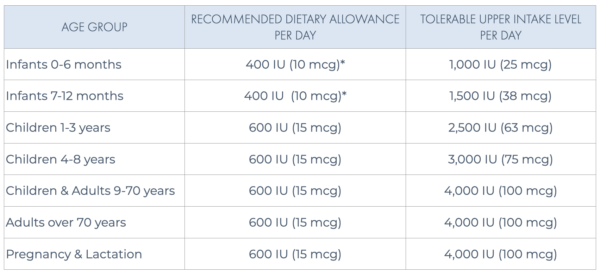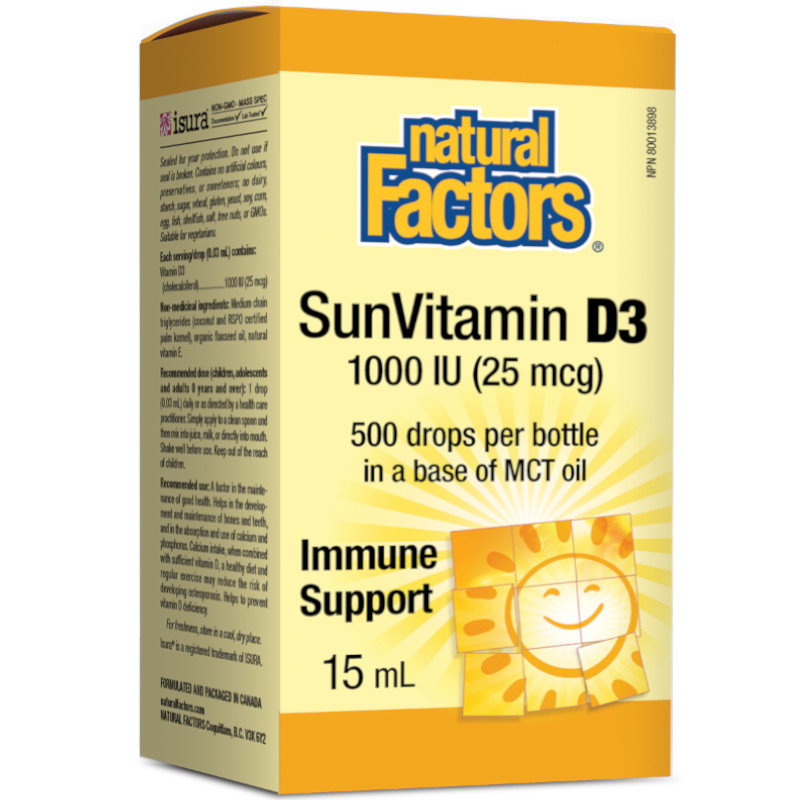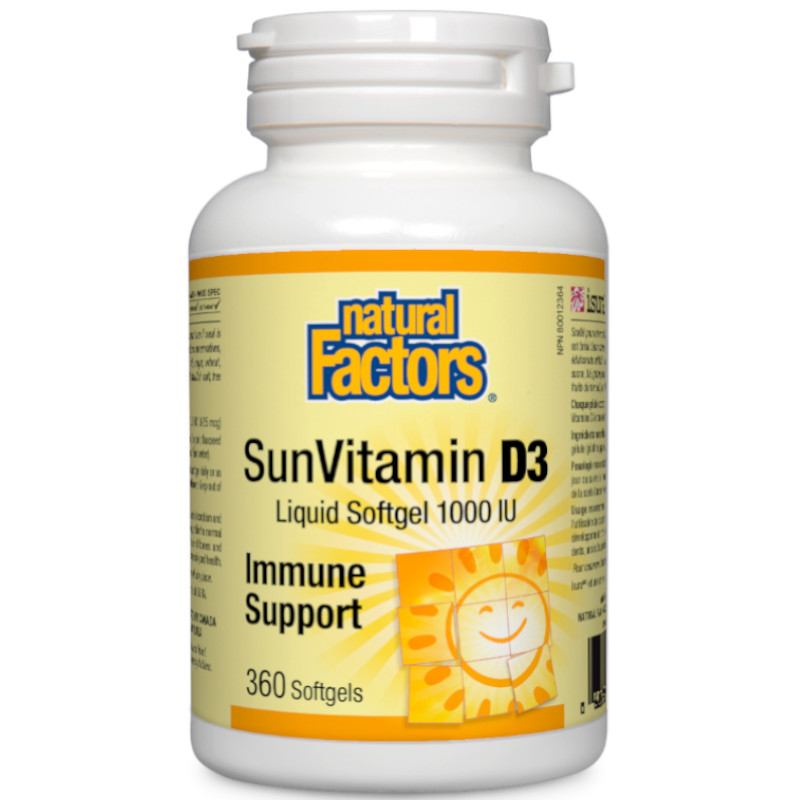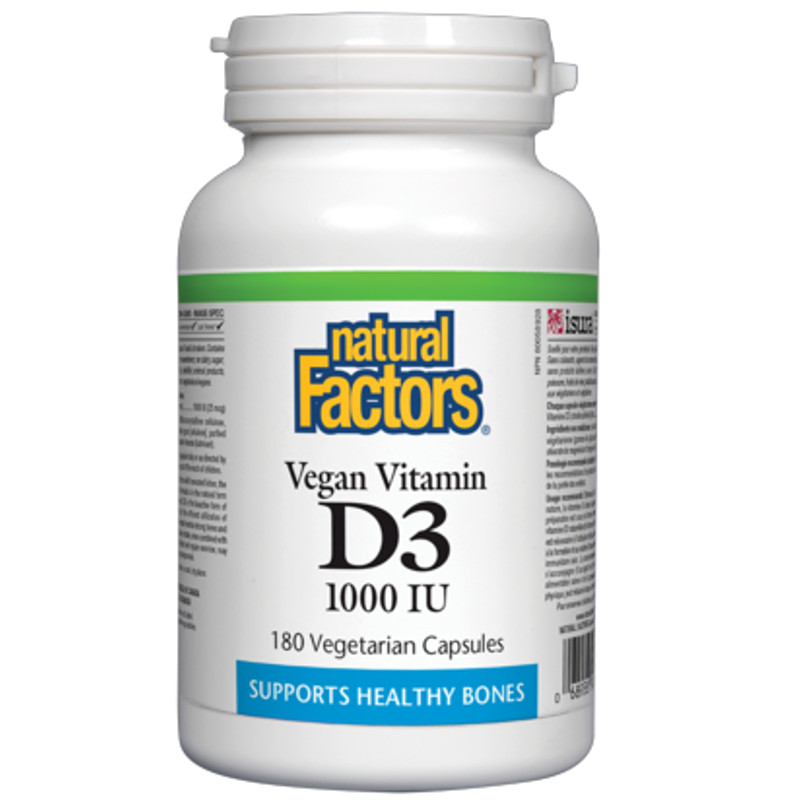
As of February 24, 2021, Health Canada increased the maximum amount for vitamin D supplements sold over-the-counter to 2,500 IU per dose for adults. The previous maximum was set at 1,000 IU per adult dose.
The change was driven by an increasing amount of evidence to support the safety of allowing higher vitamin D limits. There were also many requests from consumers, physicians, and the nutritional supplement industry to increase the limits.
“According to the Food Directorate’s review, 2,500 IU (62.5 µg) would provide a safe maximum level of vitamin D in non-prescription supplements for children 9 years and older, adolescents and adults.”**
To be clear, the upper limit is not the recommended daily intake level of vitamin D. The new limit simply reflects “the highest average daily intake of a nutrient that is likely to pose no risk of adverse effects in the general population.”**
The table below outlines Health Canada’s dietary intake guide for vitamin D, assuming minimal exposure to sunshine.
HEALTH CANADA VITAMIN D DIETARY INTAKE GUIDE

*Adequate Intake rather than Recommended Dietary Allowance
Recommended Daily Allowance (RDA): the average daily dietary intake level that is sufficient to meet the nutrient requirement of nearly all (97%-98%) healthy individuals in a particular life-stage and gender group.
Adequate Intake: the recommended average daily intake level when an RDA cannot be determined.
Our body synthesizes vitamin D through our skin’s exposure to the sun’s ultraviolet B (UVB) rays. The intensity of UVB is impacted by the time of day, time of year, cloud cover, and smog. Other factors that impact UVB absorption include the natural colour of our skin (darker skin does not absorb UVB as well), wearing sunscreen, and wearing clothing that blocks sun exposure to the skin.
Taking too much vitamin D may result in excessive absorption of calcium.
DIETARY SOURCES OF VITAMIN D
Most food sources of vitamin D are from processed foods where vitamin D has been added to the ingredients. In Canada, cow’s milk and margarine must be fortified with vitamin D. Some fatty fish may contain small amounts of vitamin D as do egg yolks. Mushrooms grown with UV lamps may also provide small amounts of vitamin D. Otherwise, the simplest way to obtain dietary vitamin D is through supplementation.
Learn more about the benefits of vitamin D on our blog post “Vitamin D: More than just Strong Bones”.
TYPES OF VITAMIN D SUPPLEMENTS
Vitamin D is readily found as a nutritional supplement in liquid drops, tablets, soft-gels, or even in a gummy form. For children, vitamin D is available in liquid drops, gummies, and chewable tablets.
The best form of vitamin D is D3. Vitamin D2 is a synthetic form of vitamin D and not as well absorbed. Vitamin D3 is naturally sourced and more bioavailable to the body. Vitamin D is commonly sourced from sheep lanolin, but there are also vegan options available.
OVER-SUPPLEMENTATION OF VITAMIN D
Vitamin D is a fat soluble vitamin that can be toxic to the body in excessive amounts. Some of the lesser symptoms of vitamin D toxicity include excessive thirst, headaches, diarrhea, general weakness, and nausea. It may not be coincidental that common symptoms of sun-stroke are similar to vitamin D toxicity. More serious toxicity of vitamin D could be increased levels of calcium in the blood and urine, leading to bone and kidney issues.
REFERENCE:
**https://www.canada.ca/en/health-canada/services/drugs-health-products/drug-products/prescription-drug-list/notices-changes/notice-intent-vitamin-d.html
Shop this page
 |
 |
 |
DISCLAIMER
Nothing contained on this website should be construed, nor is intended to be used for medical diagnosis or treatment. It should not be used in place of the advice of your physician or other qualified healthcare provider. Should you have any healthcare related questions, please call or see your physician or other qualified healthcare provider promptly.
Always consult with your physician or other qualified healthcare provider before embarking on a new treatment, diet, or fitness program. If you have any specific questions about these matters you should consult your doctor or other healthcare provider. If you think you may be pregnant you should speak to a doctor or other healthcare provider, and if you think you may be suffering from any other medical condition you should seek immediate medical attention.

